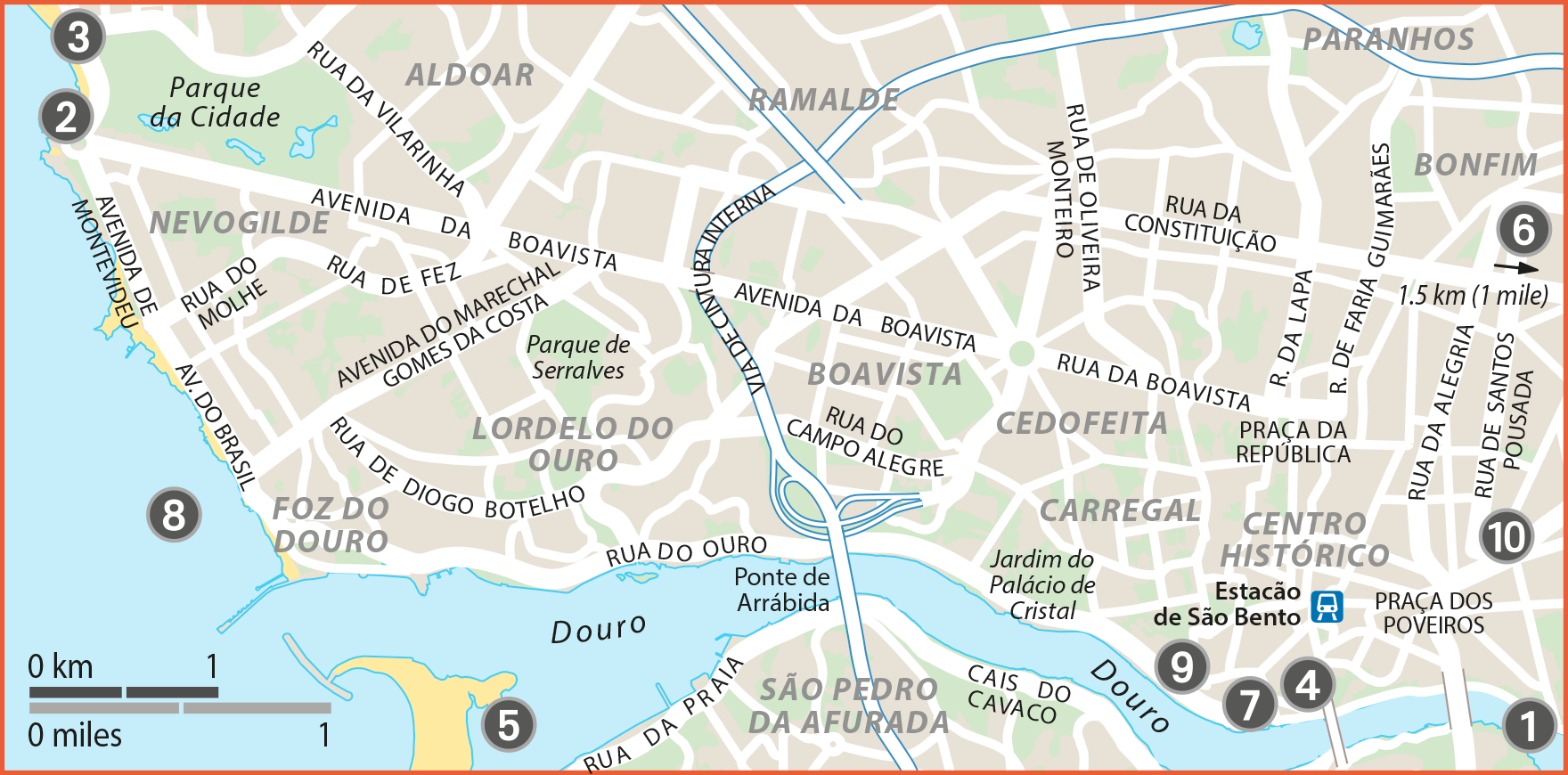OFF THE BEATEN TRACK

1. Ponte Dona Maria Pia
This graceful iron arch (see Ponte Dona Maria Pia) crossing the River Douro is sadly no longer open to walkers or traffic but it makes for a nice photo opportunity from below or silhouetted against the sunset.

Ponte Dona Maria Pia spanning the River Douro
2. Fortaleza de São Francisco Xavier
Nicknamed the Castelo do Queijo (“Castle of Cheese”), this 17th-century fortress (see Fortaleza de São Francisco Xavier), with its distinctive corner watchtowers sitting on a cliff overlooking the Atlantic Ocean, was built to defend the Douro against approaches from Moorish corsairs. It was still used during World War II. Within its formidable quadrangle of walls is a small military museum with a collection of antique arms and a bar.

Fortaleza de São Francisco Xavier
3. She Changes
American sculptor Janet Echelman’s intricate construction of wires, metal nets and angular pylons, She Changes is designed to evoke the disappearing world of the fishing community of Porto’s Atlantic coast and the Douro estuary. The 45-m- (150-ft-) wide rose-coloured structure, known as the anémona (anemone), has become an instantly recognizable neighbourhood symbol and landmark on the Foz do Douro seafront.
4. Torre do Barredo
 Rua de Baixa 5 • Not open to visitors
Rua de Baixa 5 • Not open to visitors
Rising a couple of blocks behind the Ribeira waterfront, this small 13th-century tower house is a unique survivor from the city’s medieval past and is one of the oldest secular buildings in the city. Sandwiched between newer buildings, it is not open for visits but worth a look.
5. Reserva Natural Estuario do Douro
This pocket paradise on the outskirts of the city, stretching along the sandy shores of the Baia de São Paio, is a lovely place for a stroll to blow away the cobwebs after a night on the town. Kissed by Atlantic waves, it is a pleasant spot for a picnic (see Reserva Natural Estuario do Douro).
6. Feira da Vandoma Flea Market
 Ave 25 de Abril • Open 7am–1pm Sat
Ave 25 de Abril • Open 7am–1pm Sat
Porto’s most authentic flea market eschews gaudy tourist gewgaws in favour of stalls stacked with vintage vinyl, antiquarian books and maps, clothes, crockery and household junk. Recently relocated from the Alameda das Fontainhas in the city centre, it is now in the east-of-centre Campanhã district, just a ten-minute walk from Dragão metro station.
7. Postigo do Carvão
 Rua da Fonte Taurina • Open daily
Rua da Fonte Taurina • Open daily
A Gothic inscription dating from 1386 adorns this arched gateway between Rua da Fonte Taurina and the Douro riverside. Eighteen such entrances punctuate the ring of the Fernandine Walls, which once surrounded the city. This is the only surviving example and forms part of Porto’s UNESCO World Heritage Site.
8. Submania Escola de Mergulho
 Rua do Carrical 143 • Open daily • Adm • www.submania.pt
Rua do Carrical 143 • Open daily • Adm • www.submania.pt
Giant conger eels, octopuses, and huge shoals of fish haunt the wreck of the German U-boat U-1277, scuttled by its crew at the end of World War II in 31 m (102 ft) of water off the coast of Matosinhos, just outside the city. Submania, the local dive centre, runs dive trips for all levels and rents out diving equipment.
9. Muralha Fernandina
 Rua Saraiva de Carvalho
Rua Saraiva de Carvalho
The most impressive remnant of the once-formidable Fernandine Wall is this length of sheer-sided wall studded with square turrets and arched gateways. Begun during the 14th-century reign of Fernando IV, it stretches from Rua Saraiva de Carvalho to the Ribeira waterfront.

The Muralha Fernandina
10. Ruínas de Arca de Mijavelhas
 Campo de 24 Agosto • Open 6am–1am daily • www.explorebonfim.com
Campo de 24 Agosto • Open 6am–1am daily • www.explorebonfim.com
Long buried beneath newer buildings, the remains of this 16th-century underground reservoir and 6-m- (19-ft-) deep well were rediscovered during the modernization of Porto’s metro system and can now be seen at the 24 de Agosto metro station.


